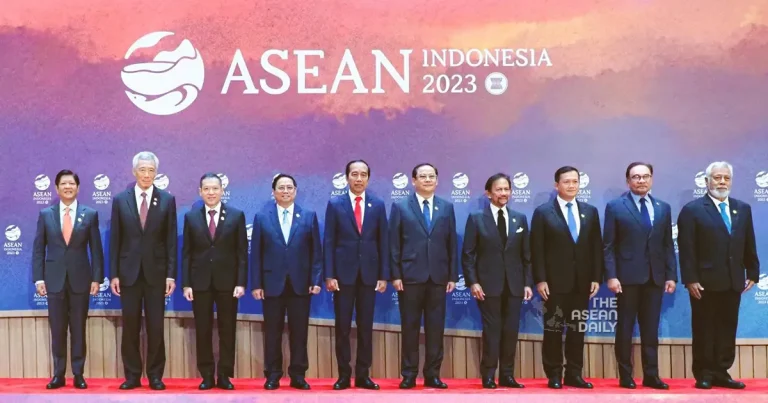9-9-2023 (JAKARTA) The Association of Southeast Asian Nations (ASEAN) must take stronger positions on issues like the Myanmar crisis and South China Sea disputes or risk being sidelined amid intensifying geopolitical rivalries, analysts warn.
Failure to do so could even render the 10-member bloc obsolete as major powers form exclusive groupings that may weaken ASEAN’s centrality and stature, they caution.
To be more proactive, analysts advocate reforming ASEAN’s consensus-based decision-making, fast-tracking economic integration and projecting a united front to resist influence from bigger powers.
Their remarks follow the recent ASEAN Summit in Jakarta which produced a chairman’s statement using identical wording on the South China Sea as previous statements. It did not mention China’s controversial new map asserting control over disputed waters.
By avoiding firm stances, analysts believe ASEAN risks emboldening China and other major powers to disregard its interests. “ASEAN demonstrates difficulty addressing pressing issues like Myanmar and China’s actions in the South China Sea,” said Associate Professor Chong Ja Ian of the National University of Singapore.
This perceived weakness “encourages leaders from world powers to de-emphasise ASEAN ties even as they pay lip service to ‘ASEAN centrality’,” he added.
At a Tuesday dialogue, Singapore Prime Minister Lee Hsien Loong said ASEAN must take collective positions on key issues or lose relevance amid geopolitical jostling.
When asked how to achieve this, PM Lee cited ASEAN’s substantive agreements and stances that benefit members despite a lack of “spectacular” breakthroughs.
Patient, persistent efforts have enabled ASEAN to “make a difference”, he said.
Clearer Voice Needed on Sea Disputes
Still, analysts believe ASEAN can insist more clearly that maritime disputes be settled by international law.
“This is not taking sides but insisting on accepted norms for handling disputes,” said Assoc Prof Chong.
ASEAN should also push ahead with negotiations for a South China Sea code of conduct (COC) with urgency, said analyst Lina Alexandra from the Centre for Strategic and International Studies.
Progress has stalled as China insists on bilateral talks while ASEAN prefers multilateral negotiations, she noted. “ASEAN must maintain this position… There should be some unity to move the needle on COC talks.”
In 2020, Brunei echoed Beijing’s stance, indicating economic dependence on China. “Some countries are hesitant to upset China,” Ms Alexandra said.
By avoiding firm objections to China’s new map, ASEAN again demonstrated reluctance, Ms Alexandra believes. “We have to take a clear stance. The only way now is to work together on the COC.”
Tougher Line Needed on Myanmar Crisis
Analysts also advocate a tougher ASEAN position on Myanmar which continues to resist implementing an agreed peace plan since the 2021 coup.
The bloc could target finances supporting the junta’s armed crackdown on civilians, said Assoc Prof Chong.
ASEAN’s approach to Myanmar demonstrates the “ASEAN minus X” formula where most members move ahead despite resistance from one.
By sidelining Myanmar’s coup leaders from key meetings, ASEAN took a collective stand amid the crisis, noted Ms Alexandra.
The bloc also aims to replace Myanmar with the Philippines as ASEAN chair in 2026. such flexible arrangements may be useful in future, she said.
Decision-making Processes Need Reform
Analysts said ASEAN should discuss ways to implement its mandate more effectively instead of adding responsibilities.
“This should address dissent and disruptiveness by particular members, regardless of whether they act for themselves or some external actor,” said Assoc Prof Chong.
Ms Alexandra advocates closing ASEAN’s development gap, especially between maritime and mainland states. More equitable growth would unite ASEAN against major power machinations, she said.
Major powers are already advancing exclusive smaller groups like the Quad (US, Japan, Australia, India) and AUKUS (Australia, UK, US) posing subtle challenges to ASEAN unity.
In contrast, ASEAN-led forums remain consistently open and inclusive, said Ms Alexandra. To stay relevant, such forums should address geopolitics more substantially to attract major powers, she added.
Will ASEAN Stay Relevant?
A more united and assertive ASEAN can still strongly influence regional affairs given its large populations and robust growth, said Ms Alexandra.
“If they really come as a group, it’s quite an influential grouping,” she said.
More active ASEAN stewardship could also temper major power rivalry in Southeast Asia, said Assoc Prof Chong. This could limit volatility and sustain economic growth – though ASEAN is presently far from achieving this.
But without change, ASEAN risks sliding into irrelevance, analysts warn. “It’s not far-fetched to imagine a world without ASEAN,” said Ms Alexandra.
Frustrated member states could abandon the bloc if key issues like the South China Sea remain unresolved, she cautioned.
Passivity on pressing concerns also encourages major powers to sideline or pressure ASEAN into accepting their preferences, said Assoc Prof Chong.
“Even ASEAN members may consider alternatives to cooperate on interests,” he warned.
Overall, analysts urge ASEAN to quickly close ranks and demonstrate its resolve on issues like Myanmar and the South China Sea disputes.
By reforming its processes and projecting stronger unity, ASEAN can influence major powers to respect its regional leadership and centrality.




